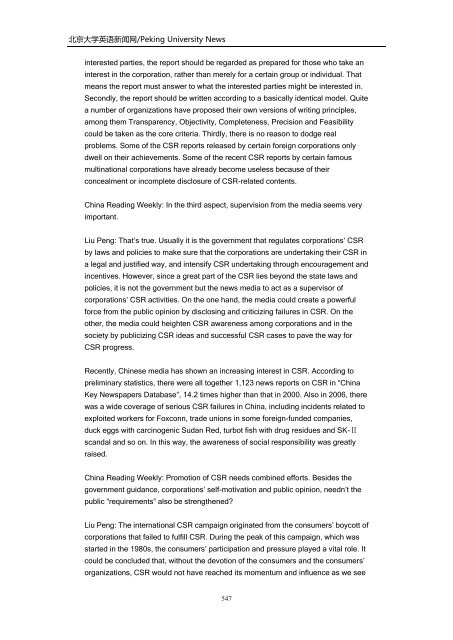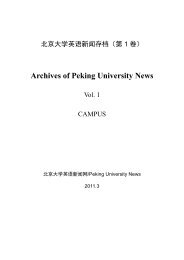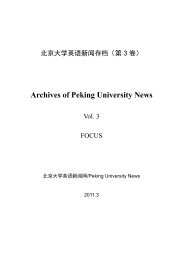Archives of Peking University News - PKU English - 北京大学
Archives of Peking University News - PKU English - 北京大学
Archives of Peking University News - PKU English - 北京大学
You also want an ePaper? Increase the reach of your titles
YUMPU automatically turns print PDFs into web optimized ePapers that Google loves.
<strong>北京大学</strong>英语新闻网/<strong>Peking</strong> <strong>University</strong> <strong>News</strong><br />
interested parties, the report should be regarded as prepared for those who take an<br />
interest in the corporation, rather than merely for a certain group or individual. That<br />
means the report must answer to what the interested parties might be interested in.<br />
Secondly, the report should be written according to a basically identical model. Quite<br />
a number <strong>of</strong> organizations have proposed their own versions <strong>of</strong> writing principles,<br />
among them Transparency, Objectivity, Completeness, Precision and Feasibility<br />
could be taken as the core criteria. Thirdly, there is no reason to dodge real<br />
problems. Some <strong>of</strong> the CSR reports released by certain foreign corporations only<br />
dwell on their achievements. Some <strong>of</strong> the recent CSR reports by certain famous<br />
multinational corporations have already become useless because <strong>of</strong> their<br />
concealment or incomplete disclosure <strong>of</strong> CSR-related contents.<br />
China Reading Weekly: In the third aspect, supervision from the media seems very<br />
important.<br />
Liu Peng: That‘s true. Usually it is the government that regulates corporations‘ CSR<br />
by laws and policies to make sure that the corporations are undertaking their CSR in<br />
a legal and justified way, and intensify CSR undertaking through encouragement and<br />
incentives. However, since a great part <strong>of</strong> the CSR lies beyond the state laws and<br />
policies, it is not the government but the news media to act as a supervisor <strong>of</strong><br />
corporations‘ CSR activities. On the one hand, the media could create a powerful<br />
force from the public opinion by disclosing and criticizing failures in CSR. On the<br />
other, the media could heighten CSR awareness among corporations and in the<br />
society by publicizing CSR ideas and successful CSR cases to pave the way for<br />
CSR progress.<br />
Recently, Chinese media has shown an increasing interest in CSR. According to<br />
preliminary statistics, there were all together 1,123 news reports on CSR in ―China<br />
Key <strong>News</strong>papers Database‖, 14.2 times higher than that in 2000. Also in 2006, there<br />
was a wide coverage <strong>of</strong> serious CSR failures in China, including incidents related to<br />
exploited workers for Foxconn, trade unions in some foreign-funded companies,<br />
duck eggs with carcinogenic Sudan Red, turbot fish with drug residues and SK-Ⅱ<br />
scandal and so on. In this way, the awareness <strong>of</strong> social responsibility was greatly<br />
raised.<br />
China Reading Weekly: Promotion <strong>of</strong> CSR needs combined efforts. Besides the<br />
government guidance, corporations‘ self-motivation and public opinion, needn‘t the<br />
public ―requirements‖ also be strengthened?<br />
Liu Peng: The international CSR campaign originated from the consumers‘ boycott <strong>of</strong><br />
corporations that failed to fulfill CSR. During the peak <strong>of</strong> this campaign, which was<br />
started in the 1980s, the consumers‘ participation and pressure played a vital role. It<br />
could be concluded that, without the devotion <strong>of</strong> the consumers and the consumers‘<br />
organizations, CSR would not have reached its momentum and influence as we see<br />
547




